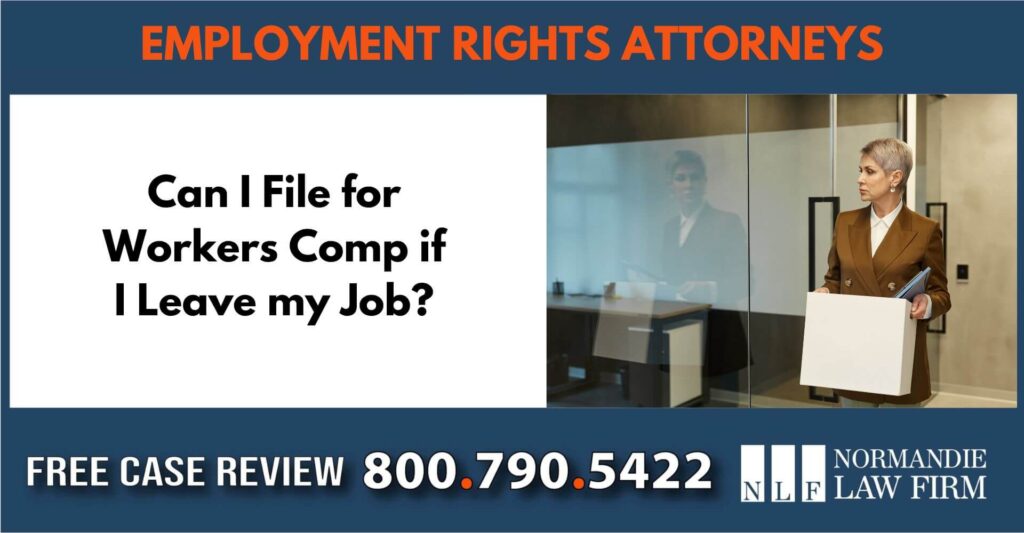California has a tradition of protecting employee rights, and that includes a comprehensive workers’ compensation system to provide monetary benefits when someone is injured on the job. The system helps employers as well, since the worker does not need to file a legal action against the employer to obtain compensation.
One question that we are asked quite often has to do with claiming these benefits if you are no longer working for your employer. Specifically, “Can I file a workers’ compensation case after I have left my job?”
Yes, California law allows you to file a WC claim as long as you were injured within the scope of employment, even if you have left or been fired from the job where you sustained the injury. If you have questions or concerns about your right to file a work-related injury claim, we are here to help, 24 hours a day, 7 days a week. Contact us immediately to schedule a free, private consultation.

Our Recent Verdicts and Settlements
$2.5 Million
$1.1 Million
$1.5 Million
$600,000
$525,000
$734,851
Coverage under the Workers’ Compensation System
With very few exceptions, California employers are required to provide workers’ compensation to their employees. Furthermore, trying to stop them from going forward with a claim or retaliating when they take legal action or attempt to assert their right to compensation is illegal.
As someone who is entitled to worker’s comp, here are the benefits you may qualify to receive:
- Medical care expenses related to treating your injury or illness, which includes payments for doctor’s appointment, prescriptions, surgery, and physical rehabilitation services.
- Temporary disability payments up to two-thirds of your average weekly pay.
- Permanent disability benefits if the injury / health condition has made it impossible for the worker to resume their job duties.
- Retraining benefits if the worker is unable to perform their job duties, but they can be trained for another type of employment that accommodates their health issues.
Employee Requirements to Access Workers’ Compensation
There are certain obligations required of employees under California laws if they wish to obtain workers’ comp payments. First and foremost, it ifsyour duty to report the accident / diagnosis of a work-related health condition to your employer within 30 days of the event. To ensure a timely resolution to your claim, we recommend that you do this immediately, even though you technically have 30 days. Additionally, you have 1 year from the date of injury to file a claim with your employer’s WC insurance provider.
The 1-year statute of limitations for a workers compensation claim may be waived under the following circumstances:
- If you have injuries caused by cumulative trauma, like carpel tunnel syndrome, you have 1 year to file a WC claim, starting from the date of diagnosis.
- Employees of the federal government have 3 years to file a worker’s compensation claim under the rules established by federal guidelines.
- If you are physically or mentally incapacitated, like being in a coma or quarantined, you may still have the opportunity to seek WC after the normal deadline of 1 year. Keep in mind, however, that extensions are not automatic, meaning they are granted on a case-by-case basis.
How Can I File for Worker’s Compensation Case after Leaving my Job?
For the most part, a case for workers’ comp is initiated as soon as you are injured from a workplace accident or report an illness resulting from your work conditions. However, some of these injuries are not discovered for many weeks or months after the fact, and at that point, you may no longer be working for the same company.
If you voluntarily left your job, there shouldn’t be any roadblocks that you keep you from accessing WC benefits. As long as you sustained the injury while you were working for the employer, or developed an illness related to your employment with them, the claim should be handled just like any other workers’ comp case.
On the other hand, if you were laid off or fired from your job, you are likely to face questions over why your employment was terminated. For example, was the injury resulting from careless or reckless actions by the employee that went against company procedures? Was the worker under the influence of drugs of alcohol when they accident occurred? Did you miss the deadline to report the injury or submit the necessary paperwork to the insurer?
In some cases, workers’ compensation is denied because the employer is acting in bad faith and retaliating against the employee for quitting, reporting them to the labor board, and other actions that are within their legal rights. This is why it’s important to discuss your case with a workers’ compensation lawyer and ensure that your employer is not taking advantage of you.
Challenging a WC Claim Denial after Leaving Your Job
It’s not unusual to face opposition from your employer when you file a workers’ compensation claim once you are no longer working for them. For example, they may argue that your injuries occurred while you were doing something not related to your employment, or that you did something to cause the accident / aggravate an existing injury. This can be a form of retaliation by your employer, especially if you have had a contentious history with them prior to giving notice or being fired.
Employees in this situation must seek legal advice right away from a California labor law attorney. Here at Normandie, we have a dedicated team of lawyers who can help you fight back and recover the damages you are owed. This includes the compensation you are entitled to from a workers’ comp case,
Fighting Tirelessly to Protect You and Your Right to Compensation
With decades of experience in workers’ compensation claims, we know what it takes to secure a favorable resolution on your behalf. We have a proven track record of recovery, along with a Zero Fee Guarantee that takes the burden of legal fees off your shoulder.
Under this agreement, you pay us $0 for the entire duration of your case. Upon obtaining your settlement from a successful workers’ comp claim, a percentage of the proceeds will be used to cover legal fees. What happens if you don’t receive compensation from a successful claim? You owe us $0 for the cost of legal services, and we eat the costs associated with your case.
We look forward to advising you and being a part of your journey to recovery. Contact Normandie Law Firm to schedule a free case evaluation.













